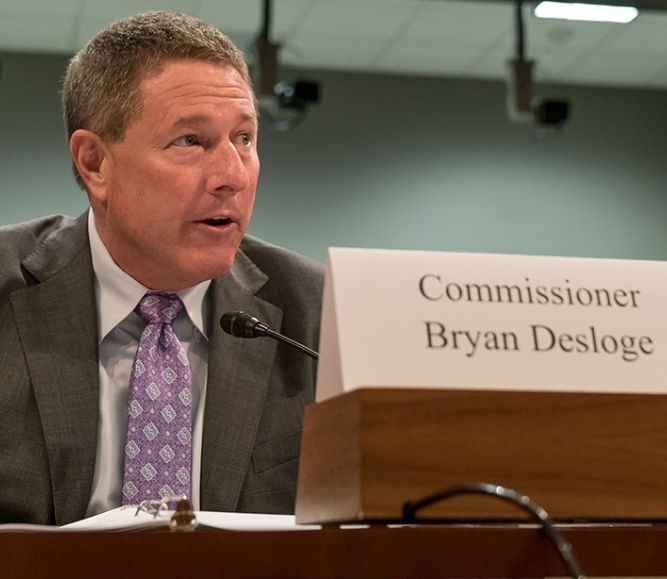Former FEMA chief is bearish on reform talks

Key Takeaways
Brock Long compared previous congressional efforts to reform the Federal Emergency Management Agency to putting shiny new parts on a rusty old bicycle.
He should know. He rode that bicycle as FEMA administrator for two years during the first Trump administration.
Now the executive chairman of Hagerty Consulting, Long offered members of NACo’s Intergovernmental Disaster Reform Task Force insight into the efforts to reform the agency. Originally scheduled to conclude its work at the Annual Conference, the task force will continue through the end of 2025.
“A lot of people have no idea what they’re blaming or what they’re saying when they say … ‘FEMA’s terrible,’” he said. “We built this system where a county supervisor or a governor has no idea what they’re entitled to when it hits the fan.”
By the same token, Long decried “mission creep” at FEMA, voicing frustration that the agency was responsible for tasks like rebuilding Puerto Rico’s power grid and addressing homelessness. He argued that other federal agencies were better equipped for those responsibilities.
“Emergency managers don’t know how to solve homelessness,” he said.
So far, Long has not encountered any truly innovative ideas in discussions about FEMA reform. Unless this changes, he fears that the proposals will amount to only minor adjustments—tweaking some programs and cutting others—without delivering a comprehensive overhaul of how emergency management is supported at the federal level.
“What are we striving for, what are we trying to reform?” he asked. “Are we trying to reduce expenses on the taxpayer or are we trying to figure out how to help the person who has nothing on their worst day?” he said. “What’s the goal of this reform?”
Instead of shifting FEMA between the Department of Homeland Security and a standalone cabinet-level position, Long recommended establishing emergency management as an independent agency, citing the Federal Communications Commission as a model.
“It should not be bounced back and forth based on the president of the United States,” he said.
Long recommended that if a new emergency management program replaces FEMA, the existing agency should remain operational for the first two years to ensure continuity during what will likely be a challenging transition.
As part of these reforms, Long also suggested that FEMA should no longer fund uninsured infrastructure or base disaster declarations on thresholds tied to losses of uninsured infrastructure, which he criticized as outdated and inconsistent. “You are penalized in this country if you adopt the latest codes of the International Code Council, if you insure your public infrastructure, if you do land use planning, you will not get a disaster declaration.”
Long explained that during his time at FEMA, officials often focused excessively on anticipating specific scenarios, but dedicated insufficient attention to addressing the immediate needs common to nearly every disaster. These include ensuring reliable systems for food, water, medical care, communications, transportation, and—most fundamentally—understanding who owns the infrastructure that could be impacted. According to Long, this is a critical area where emergency managers at every level can take proactive steps to improve preparedness.
“We sit around trying to figure out everything that could go wrong, but what we don’t sit down and figure out is what’s got to be working in your community that if it is not working, people are dying or life is disrupted,” he said.
Related News

DHS funding set to lapse, putting key county partners at risk of a partial shutdown
The U.S. Department of Homeland Security (DHS) is headed toward a funding lapse at 12:01 a.m. ET on Feb. 14 after the Senate failed this week to advance legislation to fund DHS for the remainder of Fiscal year (FY) 2026.

SBA issues new rule affecting local permitting in post-disaster rebuilding
The U.S. Small Business Administration (SBA) has issued an interim final rule that changes how rebuilding projects financed with SBA disaster loans following a Presidentially declared disaster interact with state and local permitting requirements.

Cross-training helps county 911 scale up for big emergencies
With training, Howard County, Md. staff help filter and respond to non-emergency requests for information and assistance during period of heavy 911 call volume.
County News
Intergovernmental task force looks for ways to collaborate

